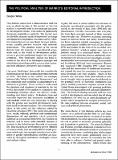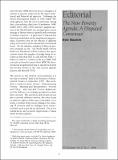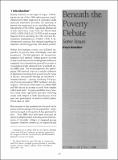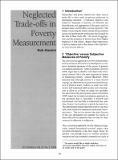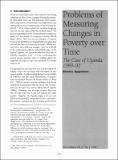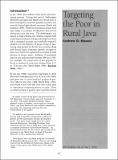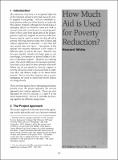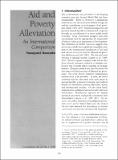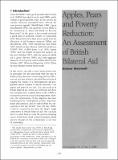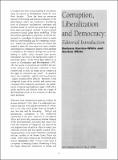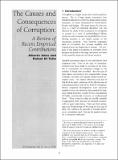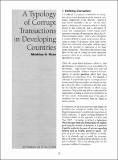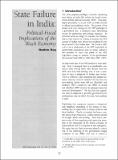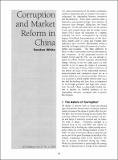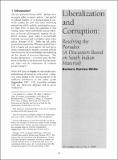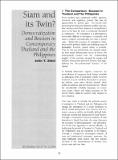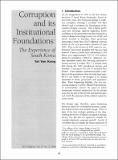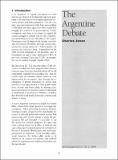Volumes 21 - 30: Getting Institutions Right for Women in Development: Recent submissions
Now showing items 281-300 of 444
-
THE POLITICAL ANALYSIS OF MARKETS: EDITORIAL INTRODUCTION
(Institute of Development Studies, 01/07/1993) -
Editorial: The New Poverty Agenda: A Disputed Consensus
(Institute of Development Studies, 01/01/1996) -
Agency, Well-being & Inequality: Reflections on the Gender Dimensions of Poverty
(Institute of Development Studies, 01/01/1996)Summary Despite their apparent gender-neutrality, most discussions of poverty have been premised on the concept of a male actor and of male-centred notions of well-being and agency. The assumption underpinning income/consumption ... -
Beneath the Poverty Debate: Some Issues
(Institute of Development Studies, 01/01/1996)Summaries Within development circles, two approaches to poverty have increasingly come into prominence: the income/consumption approach and the participatory appoach. It is argued that the different results which these ... -
Neglected Trade?offs in Poverty Measurement
(Institute of Development Studies, 01/01/1996)Summaries Discussions of the conventional income/consumption and participatory approaches to poverty measurement have focused on the trade?off between ‘objective’ and subjective measures of poverty. The trade?offs between ... -
Problems of Measuring Changes in Poverty over Time: The Case of Uganda 1989–92
(Institute of Development Studies, 01/01/1996)Summaries Official reports on household surveys of Uganda in 1989 and 1992 imply a 34 per cent fall in real consumption per household. Various adjustments are considered which reduce the apparent fall in living standards ... -
Targeting the Poor in Rural Java
(Institute of Development Studies, 01/01/1996)Summaries This article examines the regional and household characteristics of poverty in rural Java to assess the efficacy of targeted anti?poverty programmes. Analysis of household data shows important geographic and ... -
Public Expenditure Policy and Poverty Reduction: Has the World Bank Got it Right?
(Institute of Development Studies, 01/01/1996)Summaries This article discusses the impact of public expenditure policy on poverty reduction, focusing on the interaction between poverty assessments (PAs) and public expenditure reviews (PERs). Most PAs have analysed ... -
How Much Aid is Used for Poverty Reduction?
(Institute of Development Studies, 01/01/1996)Summaries Poverty reduction is a stated priority objective of many aid donors. So how much aid is directly targeted toward meeting this objective? In fact, this question proves difficult to answer. Three possible measurement ... -
Aid and Poverty Alleviation: An International Comparison
(Institute of Development Studies, 01/01/1996)Summaries This article evaluates the poverty alleviation effect of international aid provided by Japan, the United Kingdom, the United States, the Development Assistance Committee members, and multilateral organizations. ... -
Apples, Pears and Poverty Reduction: An Assessment of British Bilateral Aid
(Institute of Development Studies, 01/01/1996)Summaries Aid quality is often investigated using cross?country statistical methods. The article takes a more institutional approach. It reviews British bilateral aid, in order to investigate the complex interaction between ... -
Corruption, Liberalization and Democracy: Editorial Introduction
(Institute of Development Studies, 01/04/1996) -
The Causes and Consequences of Corruption: A Review of Recent Empirical Contributions
(Institute of Development Studies, 01/04/1996)Summary This article presents a review of recent developments in the empirical literature on corruption which uses subjective indices and survey data. The results are presented on two broad themes: contributions to ... -
A Typology of Corrupt Transactions in Developing Countries
(Institute of Development Studies, 01/04/1996)Summary Economic theory has attempted to identify the conditions under which corruption has particularly harmful effects. This article evaluates these theories and argues that the classifications offered are misleading. ... -
State Failure in India: Political?Fiscal Implications of the Black Economy
(Institute of Development Studies, 01/04/1996)Summary The underground or ‘black economy’ has been a source of considerable concern to Indian public policy analysts since the mid 1960s. In this article we argue that the black economy played a critical role in the ... -
Corruption and Market Reform in China
(Institute of Development Studies, 01/04/1996)Summary Corruption in China, in various forms, has expanded along with and as a consequence of market reforms. Rent?seeking explanations are insufficient in explaining this link, which must also consider changes in the ... -
Liberalization and Corruption: Resolving the Paradox (A Discussion Based on South Indian Material)
(Institute of Development Studies, 01/04/1996)Summary Theoretical treatments of corruption in the new political economy place bureaucrats who control public sector goods centre stage. Corrupt behaviour then involves the creation of new private property rights over ... -
Siam and its Twin?: Democratization and Bossism in Contemporary Thailand and the Philippines
(Institute of Development Studies, 01/04/1996)Summary Any understanding of corruption in Thailand and the Philippines must rest upon a broader analysis of the phenomenon of ‘bossism’ in numerous localities in these two countries. The common manifestations of bossism ... -
Corruption and its Institutional Foundations: The Experience of South Korea
(Institute of Development Studies, 01/04/1996)Summary In spite of the reformist rhetoric of South Korea's first post?military administration inaugurated in 1993, the institutional foundations of corruption remain intact ? the government?big business relationship in ... -
The Argentine Debate
(Institute of Development Studies, 01/04/1996)Summary The catastrophic consequences of misgovernment and corruption experienced by Argentina and Brazil in the 1980s are contrasted with the subsequent achievements of reforming administrations. The brake of persistent ...

